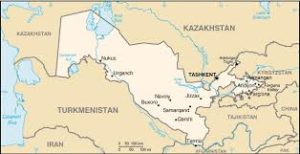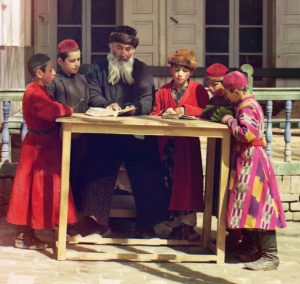 Uzbekistan, formerly part of the Soviet Union is a mountainous country that has long had a thriving Jewish community of both Ashkenazi and Sephardi background. The local Sephardim are also known as Bukharan Jews (or “Mountain Jews”), who moved into the region from Persia around the 11th century and still speak Farsi.
Uzbekistan, formerly part of the Soviet Union is a mountainous country that has long had a thriving Jewish community of both Ashkenazi and Sephardi background. The local Sephardim are also known as Bukharan Jews (or “Mountain Jews”), who moved into the region from Persia around the 11th century and still speak Farsi.
 The first Ashkenazim were merchants from the western Russian Empire, but many more arrived in the region during the Second World War to escape the German army’s advances
The first Ashkenazim were merchants from the western Russian Empire, but many more arrived in the region during the Second World War to escape the German army’s advances
deep into Soviet territory. At the time, many Uzbek families were known to take Jews into their homes and even share with them their last piece of bread.
The Uzbek Jewish population once numbered more than one hundred thousand people. Since the 1970s, when Soviet emigration controls were relaxed, thousands of Jews have left Bukhara. This process speeded up after Uzbekistan gained its independence from the Soviet Union in 1991.
Before the Communist Revolution, Bukhara had 18 synagogues. Currently, there are nine synagogues left in Uzbekistan, four of them in Tashkent. The community’s school, is thriving despite the dwindling numbers of Jews.
It teaches in Uzbek, Russian, English and Hebrew and is popular with students from the wider community for its high educational standards. The city’s Jewish cemetery is also well-maintained and gives a strong sense of how long the community has resided in these parts. However, by 2018 there was less than 500 Bukhara Jews in Uzbekistan, with about 150 in Bukhara.